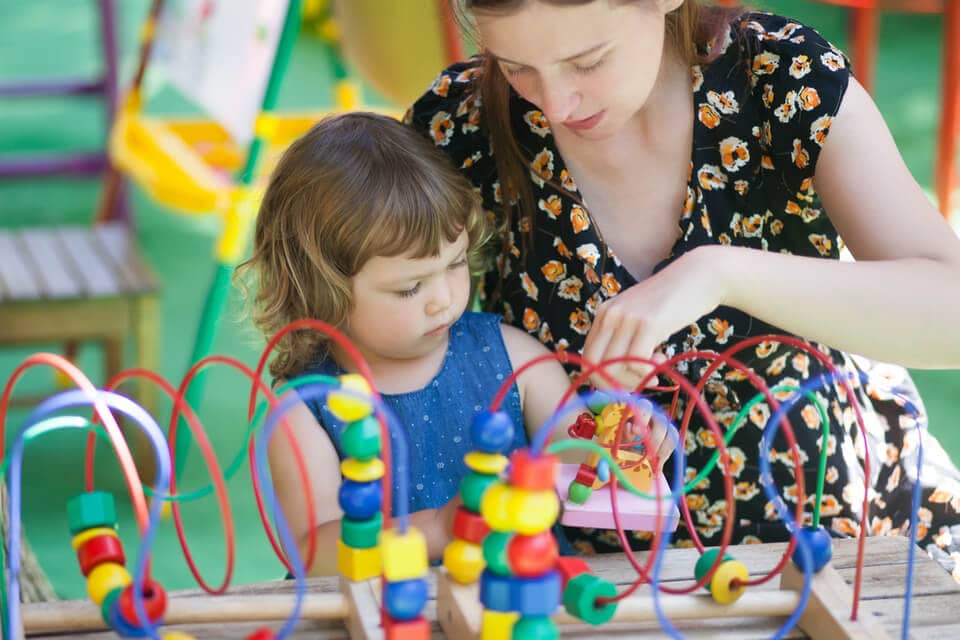By the end of first grade, the average student can read simple books and has mastered about 150 sight words. Some of these children start kindergarten knowing little more than the alphabet, and yet successfully make the transition to becoming emerging readers and writers while still primary students. Time spent reading at home is important, but the hours spent with peers in an early childhood education setting provides an additional benefit: it gives your child brain-boosting experiences that teach the social and behavioral skills to facilitate learning.
A kindergarten student sitting at circle time who is handed sheets of paper and instructed to “take one and pass the rest along” is more likely to be able to participate if they’ve had previous exposure to group-based learning activities. The ability to focus enough to follow instructions in a highly distracting environment is an important classroom skill, and one of many gained from early childhood education that will benefit your child throughout life.
Self-Regulation
Patience, turn-taking, sharing and calming oneself down after upset are all required of the child spending time with peers. No longer do they have unrestricted access to all of the Play-Doh colors or the rolling pin. They learn impulse control by waiting their turn without grabbing, and they discover that sharing can be fun. They collaborate, trade, distribute materials and gain inspiration from each other’s creations. Not only does this prepare them scholastically for future graded group projects, it also teaches interpersonal skills which reduce behavioral issues and even crime. Self-regulation is a skill learned through time spent with others, and it can have more impact on success than intelligence.
Sensory Modulation
Proprioception is the sense of body position awareness. Line-ups and carpet time are just two examples of when mastery of this awareness is important for the preservation of calm. Swinging backpacks, bumping shoulders, and stumbling feet can all result in upset soothed by prior experience with apologies and understanding. The barrage of chatter and bombardment of colors and shapes add more sensory input to a child’s neurological load and can push them to the tipping point. However, those from an early childhood education background have learned from their prior exposure to peer groups how to navigate the highly stimulating environment of school without becoming emotionally overwhelmed.
Increased Attention Span
Control of attention span is an immensely important skill coveted by all, particularly those with the inattentive version of ADHD. Even if your child is lucky enough to be free from this diagnosis, focus practice is still a huge benefit to academic and personal success. From the blissful and rapt infant’s gaze during patty-cake to the determined mindset of the LSAT writer, attention control is a state necessary for important task completion. Preschool education starts building your child’s attention span early. Scheduled activities, such as stories at the carpet or crafts at stations, even in short duration, encourage your child to maintain attention to an assigned task. When they enter kindergarten where they’ll need to follow more detailed, multi-step instructions, they’ll be ready.
Positive Experience
Early childhood education is fun. Even the children who display anxiety at drop-off time usually adjust and join in the engaging activities provided. They spend time with new friends and have access to toys and craft materials they may not have at home. When the day arrives for elementary school to begin, they have already had a good experience in a structured educational setting which eases the stress attending a new school.
Confidence
Unlike classes such as swimming and dance, where a parent usually stays to watch, early childhood education provides a safe environment for your child to gain confidence without mom or dad present. Tasks such as hanging their coats or retrieving their own snacks help them feel empowered, and separating from their parents at the start of each preschool class makes their transition to kindergarten easier.
Responsibility
A preschooler who has mom tidy up at home won’t have this luxury at preschool. Early childhood education is a setting where your child learns responsibilities such as cleaning up toys, putting away snack items and keeping the coat area tidy. Children lucky enough to be learning these tasks at home have them reinforced in the classroom with their peers. Not only does this create good clean-up habits, but it also helps the child develop the awareness that actions, such as dropping food items on the floor, have consequences.
Language Growth
From ages three to five years, your child’s vocabulary almost triples. Children who spend these critical brain-building years without exposure to new people and experiences miss out on the opportunity for language growth. This is particularly important for kindergarten preparation if you speak a different language at home than the one that will be spoken in your child’s grade school. For any child, though, regardless of culture or native tongue, the exposure to same-age peers and new adults provided by early childhood education is beneficial to language development.
Enrolling your child in an educational program prior to kindergarten has benefits that carry on throughout life. While you can spend one-on-one time with your toddler engaged in numeracy and literacy enrichment activities to prepare for kindergarten, the benefits from peer exposure in a structured, teacher-led setting are immeasurable and difficult to duplicate at home. The luckiest toddlers get both: quality time with parents at home combined with enjoyable socializing experiences in early childhood education.



